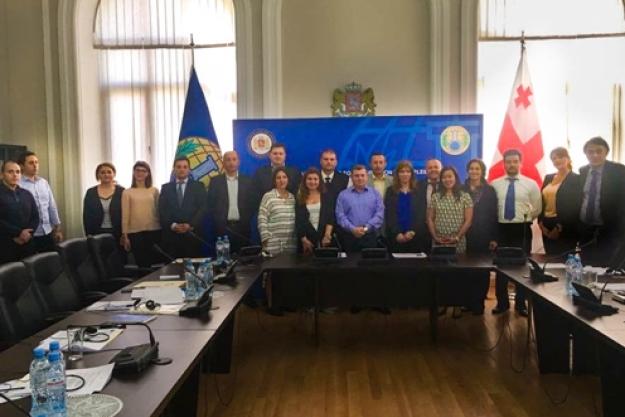
Participants at Legal Workshop in Georgia
THE HAGUE, Netherlands – 19 May 2017 – Representatives from Government Ministries in Georgia received technical assistance from the Organisation for the Prohibition of Chemical Weapons (OPCW) in developing national implementing legislation on the Chemical Weapons Convention (CWC) and establishing next steps, during a National Legal Workshop held 1-2 May in Tbilisi, Georgia.
The Legal Workshop was held at the request of Georgia and comprised of two days of tailor-made assistance in addressing gaps in its legislative framework on the CWC and in drafting text that is in line with the Convention and consistent with Georgia’s constitutional requirements.
At the conclusion of the programme, Georgia discussed its National Action Plan in which it provided an indicative timetable for the adoption of revisions to its current laws and regulations on the CWC, the main stages in their national legislative adoption process, and challenges they might encounter along the way.
Participants that attended the Legal Workshop acknowledged the significance and effectiveness of the event in enhancing their understanding of the Convention and the OPCW, and in identifying and closing the gaps in its national legislative framework on the CWC.
The Workshop was attended by representatives from the Legal Committee and Defence and Security Committee of Georgia’s Parliament, as well as the Ministries of Foreign Affairs, Defence, Justice, Commerce, Finance, Industry, Environment, Transport, Education, Internal Affairs, and State Security Service.
The Legal Workshop preceded the 16th Regional Meeting of National Authorities of States Parties in Eastern Europe and a High-Level Panel commemorating the 20th anniversary of the OPCW in Tbilisi, Georgia on 3 to 5 May 2017.
Background
As of 2016, 23 out of 25 States Parties in Eastern Europe have comprehensive legislation that is in line with the requirements of the CWC. Georgia and Armenia have legislation covering some of these requirements.
The implementation of Georgia’s obligations under Article VII of the Convention is a long-standing project that the National Authority is working to solve, with assistance from OPCW’s Technical Secretariat.
The OPCW’s Implementation Support Branch implements a number of programmes aimed at assisting States Parties in developing and adopting implementing legislation on the CWC, including legal workshops, the Internship Programme for Legal Drafters and National Authority representatives, and reviewing draft legislations that are submitted to the Technical Secretariat for comments.
As the implementing body for the Chemical Weapons Convention, the OPCW oversees the global endeavour to permanently and verifiably eliminate chemical weapons. Since the Convention’s entry into force in 1997 – and with its 192 States Parties – it is the most successful disarmament treaty eliminating an entire class of weapons of mass destruction.
To date, nearly 95 per cent of all chemical weapon stockpiles declared by possessor States have been destroyed under OPCW verification. For its extensive efforts in eliminating chemical weapons, the OPCW received the 2013 Nobel Prize for Peace.
